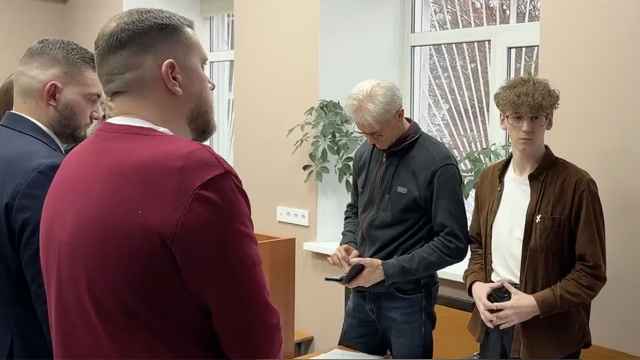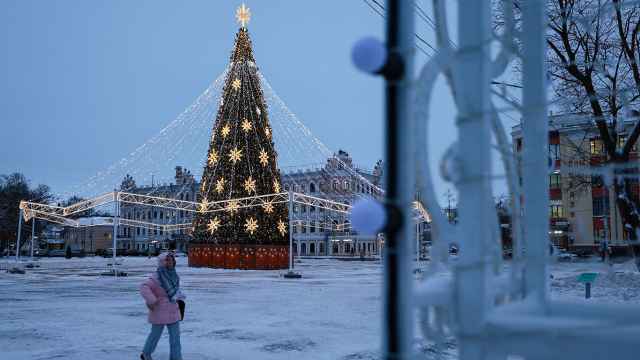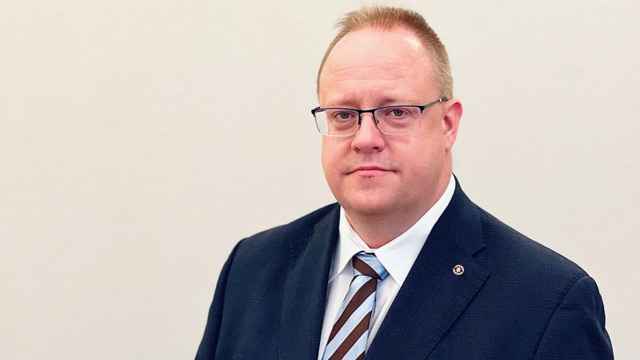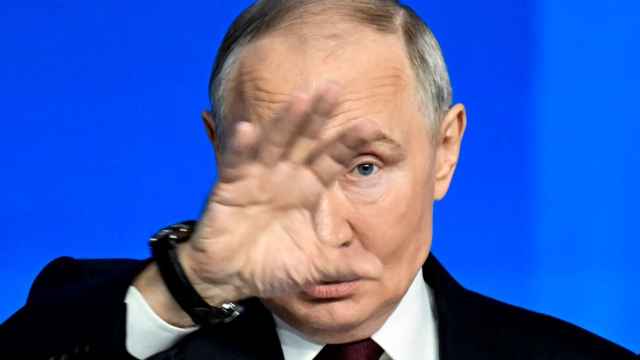A top Kremlin aide cautioned on Sunday that no “reset” looms in long-troubled relations with Britain, hours before Prime Minister David Cameron was to arrive in Moscow for the first visit by a British leader in six years.
Cameron is leading a delegation including Foreign Secretary William Hague and BP chief executive Bob Dudley to talks with President Dmitry Medvedev and Prime Minister Vladimir Putin that he hopes will boost economic ties and perhaps mend some fences.
Relations have been strained since the polonium poisoning death of former KGB officer Alexander Litvinenko in London in November 2006 and the Russian government refused to extradite Britain’s prime suspect, State Duma Deputy Andrei Lugovoi.
Cameron is facing pressure to confront the Russian side on Litvinenko, the death of lawyer Sergei Magnitsky, the prosecution of former Yukos CEO Mikhail Khodorkovsky and the fairness of the upcoming Duma elections.
No British minister or diplomat has spoken with Putin directly in the four years since Putin made a brief phone call in June 2007 to congratulate Cameron’s predecessor, Gordon Brown, on his appointment. The last British prime minister to visit Russia was Tony Blair when he attended a Group of Eight summit in St. Petersburg in July 2006.
Since becoming prime minister in May 2010, Cameron has met four times with Medvedev, who invited him for this week’s visit.
But Medvedev’s top foreign policy adviser, Sergei Prikhodko, played down any expectations that the trip, which was to start late Sunday, would result in a “reset” in relations. “I think that the visit will be pragmatic and calm,” Prikhodko told reporters Sunday. “No one is expecting any breakthroughs, and in fact they are not needed. Why fight?
“It is not necessary for us to have a ‘reset’ with Britain,” he added, Interfax reported. “We will continue to work the way that we have been working in the past.”
He said Medvedev would meet with Cameron on Monday for talks that would cover Libya, Syria, Iran and “the good results from our joint creation of TNK-BP.”
Court marshals raided BP’s Moscow office in connection with a lawsuit on Aug. 31, a day after U.S. oil major ExxonMobil struck a deal with state-owned Rosneft for an Arctic exploration that BP had hoped to clinch.
With Cameron's focus on business, four former British foreign secretaries urged him in an open letter Sunday to press Medvedev to protect companies against corruption. The letter, published in The Sunday Times, says hundreds of thousands of Russian businesspeople are behind bars after falling victim to government-sanctioned corruption.
"The dangers of this corruption do not stop at Russia's borders, and Alexander Litvinenko's murder shows the consequences of such lawlessness hitting British shores," says the letter, signed by Margaret Beckett, David Miliband, Jack Straw and Malcolm Rifkind. "In this regard the prime minister has both a domestic and international duty to tackle this issue head on during his visit."
Russia's ambassador to Britain, Alexander Yakovenko, headed off questions on Litvinenko on the eve of Cameron's trip, telling reporters in London that "Mr. Livinenko's murder was an abhorrent crime which needs to be investigated," but "the over-politicization of this issue will not help solve it."
"We have repeatedly suggested to our British colleagues that they give us the materials they have accumulated, to allow Russian prosecutors to make the necessary investigations, with British cooperation," he said Friday, according to a transcript on the Russian Embassy's web site.
He said the Russian side hoped to re-establish intelligence contacts that were cut by Britain after Litvinenko's death.
The Russian Embassy's web site, incidentally, was down Sunday after being knocked offline late Friday in a suspected hacker attack. The embassy was operating a mirror Sunday.
Lugovoi, who represents the Liberal Democratic Party in the Duma, has again denied having anything to do with Litvinenko's murder.
"If you spin it the right way … it seems obvious. But it's not a fingerprint. It's impossible to say who left the polonium," he the BBC during a fishing trip to the Kamchatka region.
Instead, Lugovoi suggested that British intelligence might have been involved.
"Litvinenko was an opportunist. … We may presume that he was involved in the polonium trade with the intention of staging an act of provocation or an act of terrorism," he said in the interview published Friday.
Prikhodko, the Kremlin aide, said the Litvinenko case "is not going to dominate the agenda."
"There are other issues that are more important," he said.
The four former foreign secretaries also called on Cameron to discuss Magnitsky, who died shortly after being brutally beaten in a Moscow jail, and Khodorkovsky, who is serving a prison term on charges that his supporters call politically motivated.
A senior European lawmaker said Cameron also should urge Putin to ensure that the Duma elections in December are democratic. Cameron is slated to hold talks with Putin on Monday afternoon.
"Cameron should stand by his principles and make it very clear to Prime Minister Putin that the upcoming election cannot be considered free and fair if the government continues to block all opposition parties of any credibility," Edward McMillan-Scott, a vice president of the European Parliament, told The Moscow Times.
The Dec. 4 vote is expected to be contested by the country's seven registered parties, of which four are in the current Duma, dominated by Putin's United Russia with a two-thirds majority.
In June, the Justice Ministry refused to register the opposition Party of People's Freedom on the grounds that it had submitted a fraudulent membership list, causing an outcry among the opposition.
Speaking by telephone from London, McMillan-Scott, a member of Britain's Liberal Democrats, who form a coalition government with Cameron's Conservatives, said Cameron should also press for the admission of Western election observers.
Their presence is "absolutely essential to ensure credibility of the poll and their absence would be construed as concerning business as usual within the Putin regime," he said.
Election observers will top the political agenda Tuesday and Wednesday, when Janez Lenarcic, the top responsible official of the Organization of Security and Cooperation in Europe, or OSCE, is holding talks in Moscow about sending observers for the Duma vote.
Earlier this month, Medvedev accused the OSCE election observer missions of double standards and of meddling in internal affairs of former Soviet nations.
Despite being a founding member, Moscow has long expressed dissatisfaction with the 56-member body's democratization efforts. Before the last Duma election in 2007, the organization angrily canceled its observer mission because of what it said were the Kremlin's unacceptable restrictions.
But Denis Bilunov, a leading activist of the Solidarity opposition movement, which is part the Party of People's Freedom, said he had little hope that Cameron could influence the country's domestic politics.
"I expect that London will act pragmatic like the majority of European countries who close their eyes to human rights violations," he said by telephone.
Bilunov said the issue of election monitors was marginal after the Party of People's Freedom was denied registration.
"It would be better for them to acknowledge that voters' rights have already been gravely violated," he said with regard to the OSCE.
A Message from The Moscow Times:
Dear readers,
We are facing unprecedented challenges. Russia's Prosecutor General's Office has designated The Moscow Times as an "undesirable" organization, criminalizing our work and putting our staff at risk of prosecution. This follows our earlier unjust labeling as a "foreign agent."
These actions are direct attempts to silence independent journalism in Russia. The authorities claim our work "discredits the decisions of the Russian leadership." We see things differently: we strive to provide accurate, unbiased reporting on Russia.
We, the journalists of The Moscow Times, refuse to be silenced. But to continue our work, we need your help.
Your support, no matter how small, makes a world of difference. If you can, please support us monthly starting from just $2. It's quick to set up, and every contribution makes a significant impact.
By supporting The Moscow Times, you're defending open, independent journalism in the face of repression. Thank you for standing with us.
Remind me later.






